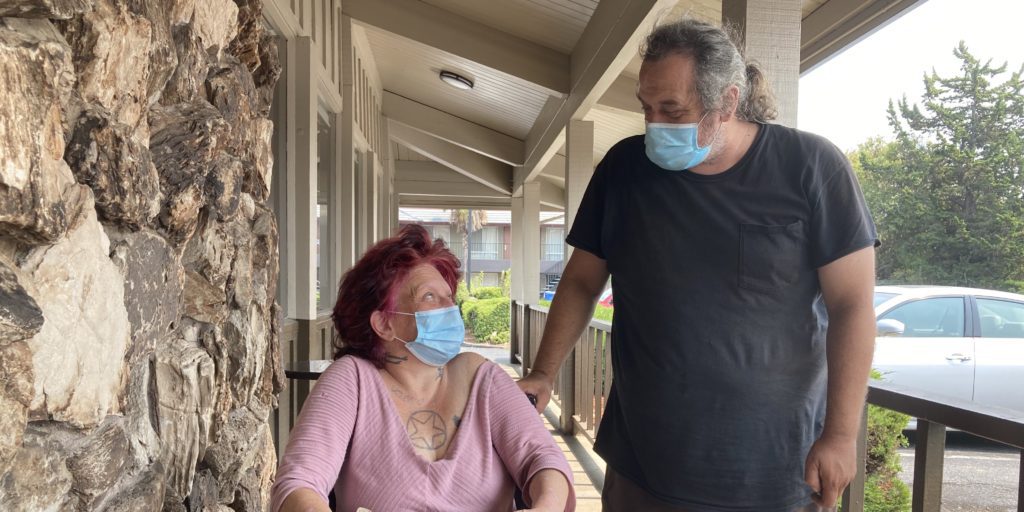When Charlotte Burris first called the Santa Clara County Office of Supportive Housing to get out of the van she uses for shelter, there were only spaces for unhoused residents with COVID-19.
Burris said she tested positive shortly after calling and received temporary housing, describing it as a gift in disguise.
“I’ve been homeless for five years, been having to live in the van for more than two (years),” she told San José Spotlight. “And I can hardly get up to walk out of this wheelchair. The doctor said I had to get spine surgery… but I guess by the time I had the surgery it was too late.”
As Burris and her boyfriend Robert Edwin Lopez got a two-week stay at a Sunnyvale hotel through the nonprofit LifeMoves, Gov. Gavin Newsom announced on Thursday the state is tripling the size of a post-pandemic initiative to provide emergency housing for residents, Project Homekey.
‘It’s going to be an expensive undertaking’
Through Project Homekey, local governments and partners can apply for state grants to secure hotel rooms, residential facilities and development of new housing. The California Department of Housing and Community Development invested another $2.75 billion for the second phase of the program.
Since Project Homekey began accepting applications for funds in July 2020, more than 6,000 affordable housing units have been created statewide with the $846 million in first-round funding. Local projects funded by the initiative include the conversion of a Milpitas motel into permanent supportive housing, and a 100-unit interim housing village in Mountain View.
Santa Clara County currently hosts four programs under Project Homekey with close to $61 million for the 362 units the county oversees, according to the state housing department.
“We are going to have to take big bold steps and spend lots of money—and that means building housing and creating housing options, not just single level ranch-style homes,” HomeFirst CEO Andrea Urton told San José Spotlight. “It’s going to be an expensive undertaking.”

A critic of group shelter facilities, Burris said having a variety of housing options is important to her sense of safety and wellbeing. Lopez pushed his wheelchair-bound girlfriend down the street from their quarantine hotel to grab some dessert at a local Dennys—just one week left in their stay.
Picking at her ice cream, Burris wondered aloud if she will live to see the day when they don’t have to worry about heat stroke from living in their van.
“My bucket list wish is to get my own place, my own room and my own toilet since most places close at 10 (p.m.),” Burris told San José Spotlight. “At that point you either have to hold it in or pee in a cup.”
Competitive funds
Despite the second phase of Project Homekey, which is expected to bring $200 million to the Bay Area according to a tweet from San Jose Mayor Sam Liccardo, county Office of Supportive Housing Director Consuelo Hernandez said the funds are competitive.
She told San José Spotlight the state anticipates opening applications on Sept. 30, and Santa Clara County will work with cities that have identified “opportunity sites” to establish new housing.
“We need to apply for the funds by identifying an eligible project that serves the target population,” Hernandez said. “Through the Homekey funding, awardees can receive funding for acquisition, rehabilitation to improve buildings and some funding for services.”
Jeff Scott, spokesperson for San Jose’s Housing Department, said the city will apply for the new Project Homekey funding, calling it an excellent opportunity to build and acquire much-needed affordable housing.
San Jose received just under $11 million through state and COVID-19 emergency funds for 75 rooms at a local Best Western-Sure Stay hotel. The Fremont-based Abode Services received close to $9 million for its supportive housing development arm to oversee 54 homes.
“(The city) was successful in seeking funds during the first round of Project Homekey and we are hopeful we’ll be successful again,” Scott said.
San Jose lawmakers first pledged in 2018 to develop 25,000 homes by 2023, with at least 10,000 units under market value. But only 3,348 housing units have been completed over the past three years, 506 of which are affordable, according to city records.
With their two-week quarantine stay coming to an end earlier this week, Lopez said he and Burris turned down an offer to be placed in a shelter—citing Burris’ anxiety and distrust of strangers.
“We’re back in the van for now, but I applied for Section 8 housing and it looks like it might come through,” Lopez told San José Spotlight on Wednesday. “It would have been great to get into a room after the quarantine, but I guess they still didn’t have enough space for us.”
Contact Vicente Vera at [email protected] or follow him @vicentejvera on Twitter.



Leave a Reply
You must be logged in to post a comment.